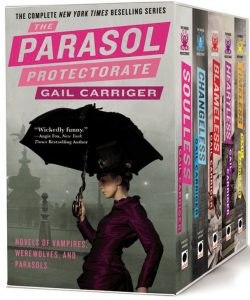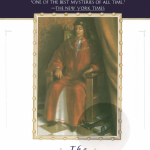Soulless , by Gail Carriger, is an exceedingly silly novel of a sort I don’t usually read. I can best describe it as a steam-punk (i.e., Victorian plus weird technology) paranormal (i.e., vampires and werewolves) bodice-ripper (lots of…well). I picked it up because I’d been seeing it on the shelves for some years (it was first published in 2009), it’s part of a complete series, and the bodice-ripper aspect wasn’t apparent in the segments I sampled at the bookstore.
, by Gail Carriger, is an exceedingly silly novel of a sort I don’t usually read. I can best describe it as a steam-punk (i.e., Victorian plus weird technology) paranormal (i.e., vampires and werewolves) bodice-ripper (lots of…well). I picked it up because I’d been seeing it on the shelves for some years (it was first published in 2009), it’s part of a complete series, and the bodice-ripper aspect wasn’t apparent in the segments I sampled at the bookstore.
The conceit is that Great Britain has mainstreamed its supernatural community. There are “hives” of vampires, each led by a queen, in most major cities of England, and packs of werewolves scattered about. All serve the empire; for example, there are many werewolves in the Royal Army. Vampires and werewolves are immortal unless killed. Both sorts recruit “daylight” folk (normal humans) as servants, and to be liaisons with the daylight world; these servants are rewarded in the fullness of time by being given the opportunity to join the hive or pack. It’s a dangerous choice, as the attempt to become “supernatural” is either successful or fatal; there’s no middle ground.
Then there’s our heroine, Alexia Tarabotti, daughter of an Italian and an English lady, who is neither supernatural nor strictly speaking one of the daylight folk. She is “preternatural”, lacking a soul.
Here’s the scheme: in Alexia’s world, “soul” is a quantifiable thing. Some people have more, some have less. (There’s a completely absurd appeal to Aristotle that amused me greatly—not only is the idea of quantifiable soul nonsense, but Carriger apparently knows precisely how nonsensical it is, and is sharing that with the reader.) Those who survive the transition to vampire or werewolf are precisely those with an excess of soul: those who perish are those with too little.
But Alexia has none; and this means that the supernatural folks have no power over her. If she should touch them, they revert (for the duration of the touch) back to merely human, losing all supernatural powers.
So much for the steam-punk and paranormal aspects of the book. On to the bodice-ripping!
It isn’t clear to me just when Soulless is supposed to take place, but it is clearly early in Victoria’s rein, and the romance aspects are more Regency than Victorian. Alexia Tarabotti is that typical Georgette Heyer character, the young spinster who believes she has put all thought of marriage behind her. In the opening scene, having accompanied her flighty mother and step-sisters to a ball at which, shockingly, no food has been provided, she has retired to the library and ordered tea from the butler—rightly judging that no one would miss her. While there, she is most unusually attacked by a vampire, which she dispatches using her trusty parasol (made of brass, with a weighted and silver-shod tip) and a wood hair pin designed for just such an eventuality. There is considerable foofaraw, and Lord Maccon arrives to investigate. Maccon is Scottish, Alpha of the local pack of werewolves, and head of the BUR, the government bureau in charge of supernatural affairs. He’s uncommonly large and studly even for a werewolf. He and Alexia have had run-ins before (including one involving a hedgehog and a loss of Lord Maccon’s personal dignity), and it is clear that they have taken a cordial dislike to each other.
You see where this is going, right? I was unavoidably reminded of Crocodile on the Sandbank, the first of Elizabeth Peter’s “Amelia Peabody” mysteries: young spinster, check, umbrella, check, studly guy with crusty personality, check, cordial dislike, check.
So how was it? Exceedingly silly, as I said, with considerably more sex than I’m comfortable with these days. I say, “sex”, but it’s not precisely graphic; rather, the tone in the relevant scenes is so arch and the language so elliptical that I can’t call it graphic, though it’s quite clear what’s going on. But here’s the thing: werewolves, who after all lose their clothes when they transform, are naturally rather casual about nudity; and of course during the course of the adventures a lot of transforming takes place. At times the book seems like an excuse for Alexia to dwell on Lord Maccon’s excellent and studly physique, sometimes (by force of situation) from quite up close; and if (very mild spoiler) Alexia and Lord Maccon wait until after the wedding to properly consummate their relationship, it’s a close run thing.
So, not really my kind of thing—but on the other hand it’s light and goofy and made me laugh quite a lot, even if I skimmed selected portions; and for those of my readers who by choice read romance novels (a genre that, other than Georgette Heyer, I’m not at all familiar with), I have a shrewd notion that the sex scenes are fairly tame by modern standards.
So, your mileage will vary; and if you try it and don’t like it, please don’t blame me.











